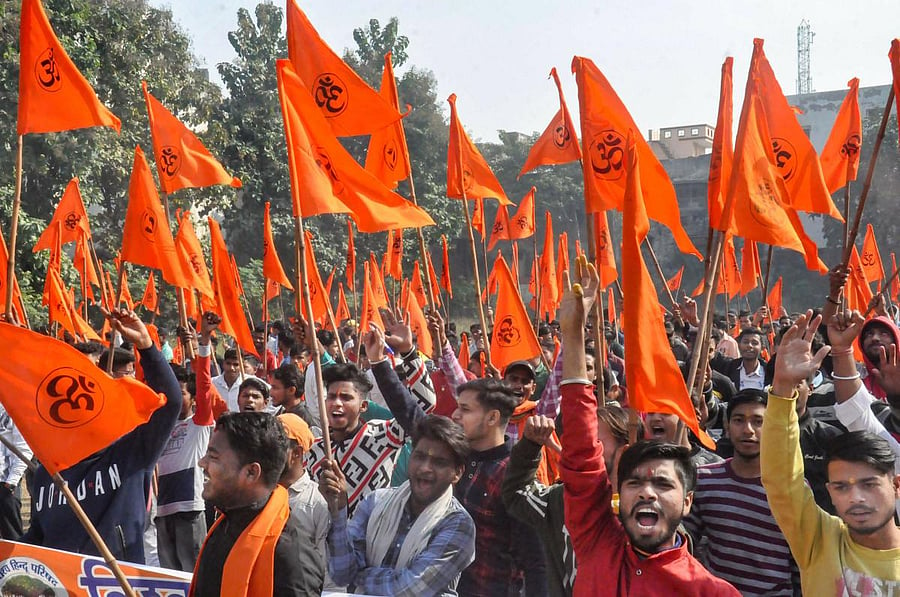
On November 28, a group of Bajrang Dal activists stormed into a church in Belur in Hassan district of Karnataka where the Sunday service was on and raised ‘Jai Shri Ram’ slogans, accusing the Christians of proselytising the people in the area. When the women in the congregation confronted the activists saying they were falsely accusing them of converting people, the mob left.
A Christian congregation that had gathered in a godown-turned-church in Matiala in West Delhi for a Sunday worship service the same day was attacked by Bajrang Dal activists and the church premises vandalised. The congregation, under the aegis of Ankur Narula Ministries, was peacefully worshipping when the activists barged into the premises and attacked them. Earlier in October, Vishwa Hindu Parishad activists forced themselves into a church in Hubballi and sang bhajans squatting there.
These are just a few instances of attacks on Christians which of late have been on the increase across the country, more so in Karnataka due to provocative statements by a BJP MLA and other leaders. The Karnataka government proposes to introduce an Anti-Conversion Bill in the winter session of the legislature, which Christians feel is more of an anti-Christian Bill to target the Christian community. The word going around among the majority community is that the Christian population is on the increase and further growth needs to be arrested. Fundamentalist elements of Bajrang Dal and Vishwa Hindu Parishad are known to have stormed churches and attacked worshippers during their Sunday services (not mass, as most news reports indicate, as mass is held in Catholic churches and service in Protestant churches).
The fear among the majority community is ill-founded and based on falsehood. On the contrary, the percentage of the Christian population in the country has declined from 2.34% in 2001 to 2.30%, according to the 2011 census. In Karnataka, the figure stood at 1.90% in 2001 which came down to 1.87% in 2011. It was about 3% in 1947. Even if we were to presume that there have been conversions, does that make anyone less Indian than their other countrymen or any less nationalist? Christian leaders like Rajkumari Amrit Kaur, Pandita Ramabai, Madhusudan Das, K C Banerjee and several others fought alongside others for the country’s freedom.
According to the data compiled by the Religious Liberty Commission of the Evangelical Fellowship of India, there were 327 incidents of violence against Christians across the country last year in which five people lost their lives, six churches were burnt down and 26 persons were subjected to social boycott, merely because they happened to hold on to their Christian faith. A maximum of 95 incidents took place in Uttar Pradesh, while Chhattisgarh accounted for 55, Jharkhand 28, Madhya Pradesh 25 and Tamil Nadu 23.
In the first half of 2021, 145 incidents of violence against Christians were reported in which three were killed, 20 ostracised and 22 churches vandalised. Madhya Pradesh, with 30 incidents, figured on the top, with Uttar Pradesh accounting for 22, Karnataka 14 and Chhattisgarh 13.
Although Article 25 provides for freedom to profess, practise, and propagate one’s religion, the liberty has been curtailed to the extent that even worshipping in one’s own house has become a dreaded proposition. The impunity with which fundamentalists attack churches and congregations in hordes even in the presence of the police sends out a clear message that they have the state’s backing.
Speaking to a TV channel, the Archbishop of Bengaluru Rev (Dr) Peter Machado expressed his apprehension that once the anti-conversion law is passed in Karnataka, fundamentalists would feel adequately protected by the law to go about attacking churches and congregations. He opined that such a law should not be enacted lest Christians fear for their lives staying in the state.
Role of the police
Unfortunately, the police have played a dubious role. Instead of providing adequate security to Christians, they have been warning them not to congregate for meetings or prayers. At times, they have joined fringe elements and silently watched when the churches and congregations were attacked. How can they ask any community not to practise their religion? A false narrative has been propagated across the country that Christians forcibly convert people. Had the Christians been converting, their population would not have dwindled.
Under the pretext of conversion, pastors and church leaders are being incarcerated. To harass Christians, one has to merely file a false complaint with the police and the ordeal begins. How is one to prove that he has not forced anyone to convert while the complainants spew blatant lies? In compliance with an order by a Karnataka Legislative Committee to conduct a survey, the tahsildar of Hosadurga taluk in Chitradurga district ordered an investigation in two villages and found that there was not a single instance of forced conversion. All Christian families confirmed that they had converted of their own volition and they attributed their wellbeing to the new religion adopted by them. Fully convinced that the allegations of conversion were fallacious, the tahsildar ended any further investigations into the matter and sent a report to the Committee.
The police need to be reminded that they are to protect every citizen by enforcing the law and not the diktats of political bosses or fringe elements. The Gurugram police recently set a befitting example by deploying hundreds of policemen around the places where Muslims were offering their Friday namaz when certain elements of Bharat Mata Vahini attempted to disrupt it. They arrested a leader and sent him to judicial custody while 10 others were detained and later let off. An example that needs to be emulated by other police forces.
(The writer is retired IGP, CRPF)
Check out DH's latest videos: